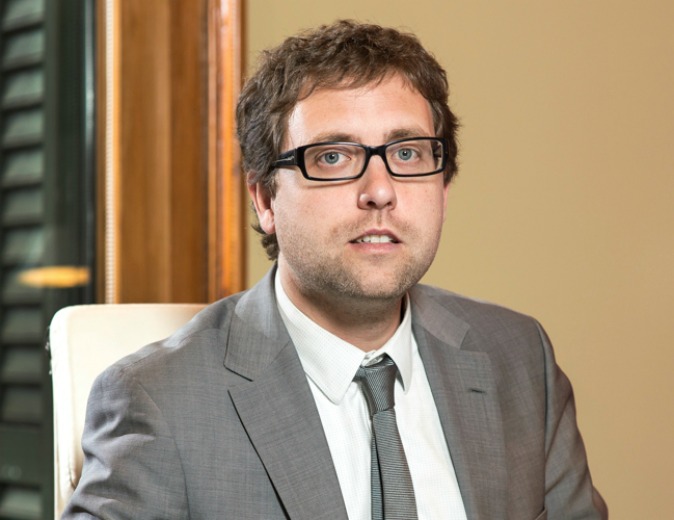10.09.2014 - 14:34
‘After the ‘via catalana’ (the Catalan way), the most sceptical governments realise that the Catalan problem was not invented by the political leaders, but was rather a grass roots movement’. Albert Royo, the Secretary-General of the Council of Public Diplomacy of Catalonia (DIPLOCAT), recognises that the citizens’ mobilisations such as the multitudinary V that is expected tomorrow in Barcelona, are its calling card to the world. ‘It is very useful for those of us explaining what is happening here abroad’. Although he does not deny that there are governments against the process, in his interview with VilaWeb he shows his optimism. ‘If the people of Catalonia remain behind it in a majority and peaceful way, the international community will adapt to the resulting democratic expression.
—These days you have intensified your activities in Diplocat. What kind of answers are you finding abroad? Do they understand what is happening in Catalonia?
—We must distinguish between the reactions of governments and that of public opinion; public opinion is always more positive. The message we send is that the Catalan process is democratic and peaceful, and seeks to increase the democratic quality of the system. As for the governments, it would largely be necessary to distinguish between three kinds of replies: those which do not view the process kindly, which I would say are the minority; those that believe it might be a legitimate process but do not encourage it, and I would say these are the majority; and then there is a third group, in which there are a few governments which, having been through similar situations, have a very open position with respect to the exercise of the right to self-determination.
—Has the perception of the Catalan claim changed amongst the governments of Europe?
—We must be clear that governments will always try to save themselves a new problem if they can, and at the present time we are another problem on the table. The attitude of governments has always been highly pragmatic. What has changed is that it is no longer seen as an irresponsible claim. There were those who thought that we were causing a problem in the continent simply to achieve better financing. But especially since the ‘via catalana’, these more sceptical governments have realised that the Catalan problem has not been invented by political leaders but is rather a grass roots movement. This is why it is so important that the massive mobilisations must send a clear message.
—Tomorrow hundreds of thousands of people will concentrate in Barcelona…
—Yes, and to those of us explaining what is happening abroad, it is very useful. If the people of Catalonia continue to push the process forward in a democratic and peaceful majority, the international community, which is pragmatic in the end, will adapt to the resulting democratic expression. Tomorrow’s V mobilisation is key. It has to be explained and people have to be reminded that eighty percent of the citizens want to vote. If we do this, the day there is a democratic mandate to constitute a new state, I am sure there will be a pragmatic reaction from the rest.
—Has one of the most significant changes in recent months been the information the international media are offering about Catalonia?
—Yes, there has been a growing interest in what is happening in Catalonia and this is largely due to the citizens’ mobilisation. I therefore insist that the work we can do from the institutions is aimed at promoting these mobilisations. There are many foreign journalists accredited for tomorrow’s demonstration.
—What is the most surprising thing about the process abroad?
—Above all the citizens’ mobilisations with a diversity of peaceful ideologies. It also contrasts considerably with the Scottish case, which is a top-down process led by a political party and above all its leader, Alex Salmond. The Catalan cases quite the opposite, it is more complex and it is society which is driving it. In the Scottish case it is easier to take decisions but they are not so widely accepted or transversal as the Catalan. The Scots ask us what we have done to achieve this citizens’ mobilisation!
—The cancellation of the presentation of Victus at the Instituto Cervantes is certainly not the first case of a boycott. What strategy is the Spanish government following?
—We try to go ahead with activities in a positive way without confrontation to such an extent that we often invite representatives of the Spanish embassies to take part in round tables. Their usual reply is to turn down the invitation. Something else that has often happened is that an embassy representative from the place in question gives a 10 minute speech explaining the position of the Spanish government. What happened in Amsterdam at the presentation of Victus had already happened to Science Po in Paris last Friday. However, they very often try to cancel events, even those which are academic.
—What is Diplocat’s priority for these decisive months?
—To continue working intensely to explain the Catalan case to the world. It is important that we should offer our version of events to the world, which is why we created the website cataloniavotes.eu. We have to counter the fact that it is so difficult to get official visits from international figures, that such visits can only be made discreetly, and that the Catalan institutions should be received on the level they deserve. The use of the social networks, what we call digital diplomacy, makes the work easier because they give access to many doors.



